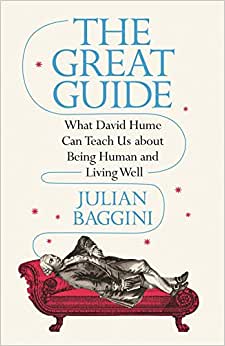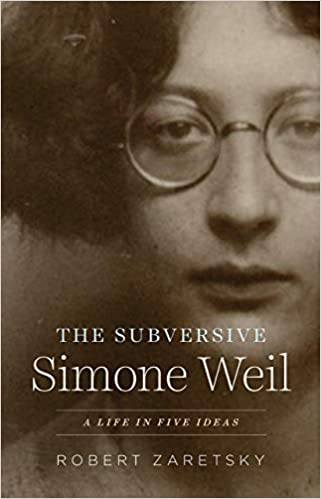Reviews: The Subversive Simone Weil: A life in five ideas, Robert Zaretsky | The Great Guide: What David Hume can teach us about being human and living well, Julian Baggini
It would be hard to find two more contrasting philosophers than Simone Weil and David Hume. Weil was a French woman from a well-off family who died young by starving herself in 1943 in London in sympathy with war-ravaged Europe. Weil’s ideas, writes Robert Zaretsky in his book on Weil, were ‘at best impractical and at worst inhuman’ – even if he still sees her as ‘exemplary’. The eighteenth-century Scot was something of a gourmand who rose through the ranks of the middle class and led a comfortable life extolling the virtues of good sense, reason and moderation (even if as an older man he described himself as fat and lazy).

Hume, as famous as he is, is not as famous as he should be, writes Julian Baggini, because he had modest ambitions for philosophy. Hume sought balance and was repelled by extremism. He happily spent time with those with whom he disagreed (including clergy). He thought philosophy incapable of definitive statement. He emphasised reason, but also experience and observation, and for this reason is important for the philosophy of science. This was also the reason he was sceptical of miracles – he thought if something went against the experiences of the vast majority, it was unlikely to have happened. As critics have noted, this is, though, exactly the definition of a miracle, so it’s hardly a knock-down argument.
But Hume was not ruled by cold reason. He understood the need for emotion in morality, in keeping with his tendency for balanced opinion.
Weil was a teacher attracted to Marxist politics, as she had great empathy for the marginalised working class. She questioned everything but was impatient with philosophers who had bold ideas but didn’t understand the poor. Because of this, she wrangled her way into a metalworking job, in order to know what the working class experienced. But she was hopeless at manual labour. After the factory, she applied her equally unsuited hand to farm work.
In wartime Europe Weil’s sympathy for victims of the powers of war and industry only intensified, and a somewhat mystical conversion to Christianity reinforced the importance of questions of good and evil and suffering. Her writings were marked by contemplation of suffering and the importance of compassion, but she saw contemplation as a springboard for action in community, not as an excuse to withdraw into the mind.

Despite the differences between them in outlook, both Hume and Weil argued that the proof of the philosophical pudding was in the eating. Despite its popular ivory-tower image, philosophy is all about how it works in practice, in everyday life. For all her craziness, Weil was pragmatic in this sense. This is partly why she insisted on working in factories and farms – if radical politics didn’t work in settings it was meant for, it was useless.
And both, in their own ways, focussed on community. Zaretsky recalls Hume criticising Rousseau’s self-centred philosophy, saying that there is no self without society, a notion that was emphasised by the likes of Wittgenstein in twentieth-century philosophy, and plays out in Christian practice, monastic hermits aside.
Hume saw much Christianity as extremism. Weil never fully embraced the church, and she criticised Christianity’s institutionalisation and sometime complicity with secular power, but, for her, extremism was the truth of Christianity – Jesus’ ideals, as highlighted in the gospels, were extreme self-denial leading to Spirit-filled compassion. Hume, in contrast, thought a modest degree of pride helpful for engaging in society. Where Weil is confrontational, Hume seems boringly sensible.
Hume’s atheism was complicated. He wrote that he couldn’t quite call himself an atheist because he couldn’t be sure there was no God. But Baggini insists he was one, and gradually reveals his own agreement with Hume’s scepticism. Hume thought Christian theology too self-contained in its logic, and the reward of an afterlife simply wish-fulfilment with no basis. The clergy dominated because of the fear they cultivated in their flocks. Baggini calls it ‘meanness’.
Hume was certainly right to criticise aspects of the Christianity of his era, and Weil might have agreed with much of it. She might have agreed with Hume’s statement that when people are safe and comfortable, they have no need of religion, but from a different angle. She might have said that fear and oppression is very real for the people she identified with – people far from Hume’s circle – and that it is not reward but compassion that is the mark of a religious life. The lengths she went to in her compassion would likely have not made much sense to Hume. The comfortably well-off usually don’t get Jesus’ radicalism either.
Weil and Hume provide examples of how philosophy grows from context. Their outlooks are very different, but also equally difficult – extreme compassion and sacrifice in the face of oppression, and consistent openness and moderation in pursuit of a harmonious community. Hume and Weil both have their faults, and Zaretsky and Baggini don’t avoid them. But, interestingly, they both describe Weil and Hume as guides for how to live, rather than simply explainers of life.
Nick Mattiske blogs on books at coburgreviewofbooks.wordpress.com and is the illustrator of Thoughts That Feel So Big.













